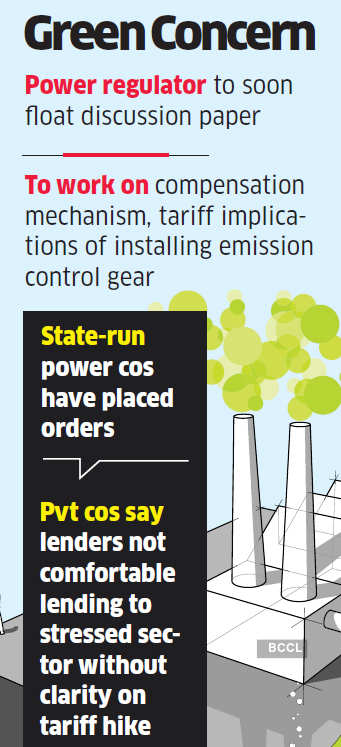
However, lenders and power companies have said that most projects have not placed orders for the equipment and hence it was not possible for them to complete retrofitting these equipment by 2022
NEW DELHI: Power regulator Central Electricity Regulatory Commission (CERC) will chart out a mechanism to determine provisional increase in electricity tariff from power plants that install emission control equipment, in some relief to power companies and lenders.
However, lenders and power companies have said that most projects have not placed orders for the equipment and hence it was not possible for them to complete retrofitting these equipment by 2022.
Some financial institutions have sought the government’s intervention in advancing the deadlines by two years. While state-run power generating companies and PSUs including NTPC have placed orders for the equipment, private companies are yet to catch up. Private companies have said lenders were not comfortable in lending to the stressed power sector without clarity on tariff hike. CERC had in 2018 issued an advisory to power companies that investments made in equipment to meet environmental norms will be passed on to consumer tariffs.
In an order in the case of Reliance Power’s Sasan Power Ltd, CERC approved provisional capital costs related to installation of Flue Gas Desulphurisation (FGD) system, which experts said is likely to provide comfort to financial institutions. “However, we recognise that certainty of stream of cash flow in form of tariff is likely to give further comfort to these financial institutions and that it is also equally important for the procurers as well as sellers to know the tariff implications on account of installation of FGD system,” the regulator said its order issued on Thursday. The regulator will soon float a discussion paper on compensation mechanism and tariff implications of installing emission control gears.
A senior executive with a lending institution welcomed the order and said it would give confidence to lenders for funding FGD as the tariff impact will be known upfront. He, however, said that the implementation of the emission control gears should be delayed at least by two years as some power plants do not have adequate power purchase agreements. “The entire investment in FGD cannot be compensated by tariff increases for part PPA,” he said. Lack of demand and PPAs has been a worry for the power sector and according to experts, the situation is not likely to change in near future.
Association of Power Producers director general Ashok Khurana welcomed the CERC judgment. “Right from beginning, APP stand has been that without fixation of provisional tariff, financing of FGD equipment would not be possible and there is no legal impediment to it. Finally, with this order, APP stand has been vindicated. Final order on provisional tariff needs to be expedited to avoid further delay in installation of air pollution control equipment,” he said.
The environment ministry had notified new environmental norms for particulate matter, sulphur oxides (SOx), nitrogen oxides (NOx), water consumption and mercury for thermal power plants on December 7, 2015. In order to ensure uninterrupted power supply in the country, a phased implementation plan for installation of FGD in plants for a capacity of 161,402 MW and upgradation of 64,425 MW plants by 2022 was prepared by the Central Electricity Authority in consultation with the stakeholders.
The CPCB has said that projects which fail to comply with the new emission norms by the specified deadlines would be considered non-complying and be liable for penal action, including closure of the plant and imposition of environmental compensation.















